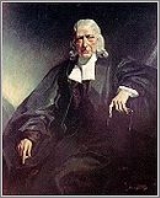
, as founding the Methodist movement
which began when he took to open-air preaching
in a similar manner to George Whitefield
. In contrast to George Whitefield's Calvinism
, Wesley embraced the Arminian doctrines that were dominant in the 18th-century Church of England. Methodism in both forms was a highly successful evangelical
movement in the United Kingdom, which encouraged people to experience Jesus Christ personally.
Wesley's teachings, known as Wesleyanism
, provided the seeds for both the modern Methodist movement, the Holiness movement
, Pentecostalism
, the Charismatic Movement
, and Neo-charismatic churches
, which encompass numerous denominations across the world.
I observed, "Love is the fulfilling of the law, the end of the commandment." It is not only "the first and great" command, but all the commandments in one. "Whatsoever things are just, whatsoever things are pure, if there be any virtue, if there be any praise," they are all comprised in this one word, love.![]()
I look on all the world as my parish; thus far I mean, that, in whatever part of it I am, I judge it meet, right, and my bounden duty, to declare unto all that are willing to hear, the glad tidings of salvation.![]()
Every one, though born of God in an instant, yet undoubtedly grows by slow degrees.![]()
The longer I live, the larger allowances I make for human infirmities. I exact more from myself, and less from others. Go thou and do likewise!![]()
Beware you be not swallowed up in books! An ounce of love is worth a pound of knowledge.![]()
Passion and prejudice govern the world; only under the name of reason. It is our part, by religion and reason joined, to counteract them all we can.![]()
In returning I read a very different book, published by an honest Quaker, on that execrable sum of all villanies, commonly called the Slave-trade. ![]()
No circumstances can make it necessary for a man to burst in sunder all the ties of humanity.![]()

